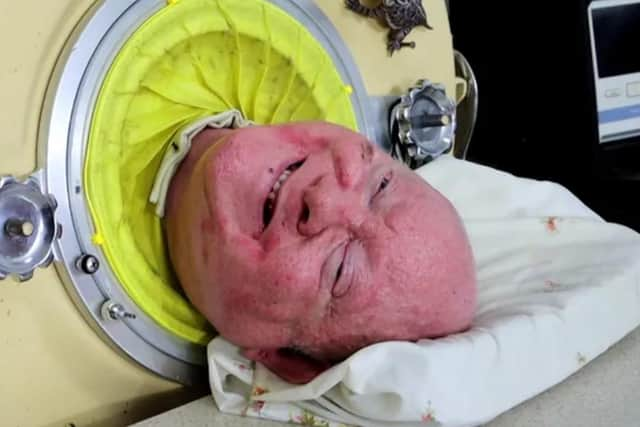Man in the iron lung Paul Alexander dies - what is an iron lung and and can you catch polio in UK?
Paul Alexander, whose inspiring story as one of the last men to live in an iron lung led to him becoming known as "Polio Paul", has died aged 78 following a Covid-19 infection.
But how did he end up in an iron lung – and what did the device do?
What is polio?


Advertisement
Hide AdAdvertisement
Hide AdPolio is a highly infectious viral disease that used to exact a terrible toll on humanity. It is primarily a gastrointestinal disease, which can spread to the nervous system and cause paralysis. This paralysis is what led to the creation of the iron lung.
What is an iron lung?
There is no treatment for polio, so patients – usually children – who were paralysed by polio outbreaks had to be placed in machines which manually contracted and expanded their chests, allowing oxygen to enter their lungs. In effect, the iron lungs were breathing machines.
Who was ‘Polio Paul’?


Paul Alexander, who lived inside an iron lung for 70 years, contracted the viral disease in the summer of 1952 when he was six years old and was left paralysed from the neck down.
Despite his affliction, Mr Alexander learned to memorise school lessons, instead of taking notes, and graduated high school in 1967. He received a scholarship to Southern Methodist University, but then transferred to the University of Texas at Austin, where he earned a bachelor's degree in 1978, then a doctorate in 1984.
He then worked by teaching legal terminology to court stenographers at an Austin trade school, before being admitted to the bar in 1986.
The Guinness World Records lists Mr Alexander as the person who has spent the longest time in an iron lung.
“The longest period for a person to make daily use of a negative-pressure ventilator (or ‘iron lung’) is 70 years, set by Paul Alexander of Texas, USA, who was placed in an iron lung in July 1952 after being paralysed by polio,” the record reads.
Mr Alexander died due to an infection caused by Covid-19 on Monday at the age of 78. An update on his GoFundMe page reads: "Paul Alexander, 'The Man in the Iron Lung', passed away yesterday.
Advertisement
Hide AdAdvertisement
Hide Ad"After surviving polio as a child, he lived over 70 years inside of an iron lung. In this time, Paul went to college, became a lawyer and a published author.
"His story travelled wide and far, positively influencing people around the world. Paul was an incredible role model that will continue to be remembered."
Can you catch polio in the UK?
Thankfully, polio has been all but eradicated in the western world due to vaccination programmes. There have been no confirmed cases of paralysis due to polio caught in the UK since 1984.
“Although some poliovirus has been found in sewage from London recently, the risk of getting it remains extremely low,” according to the NHS.
“The chance of getting ill from polio is higher if you are not fully vaccinated, so it's important to make sure you, and your child, are up to date with your vaccines.”
Polio was eradicated in Europe in 2003. The NHS states there is still an extremely small risk of catching the disease when travelling in a country where polio is still found, such as Afghanistan and Pakistan.
If a person is not vaccinated, there is also a very small risk of getting it through contact with a person bringing the polio virus from these countries when they return to the UK.
The polio vaccine is part of the NHS routine childhood vaccination schedule, given to children at eight, 12 and 16 weeks of age; three years, four months old; and 14 years old.
Comments
Want to join the conversation? Please or to comment on this article.